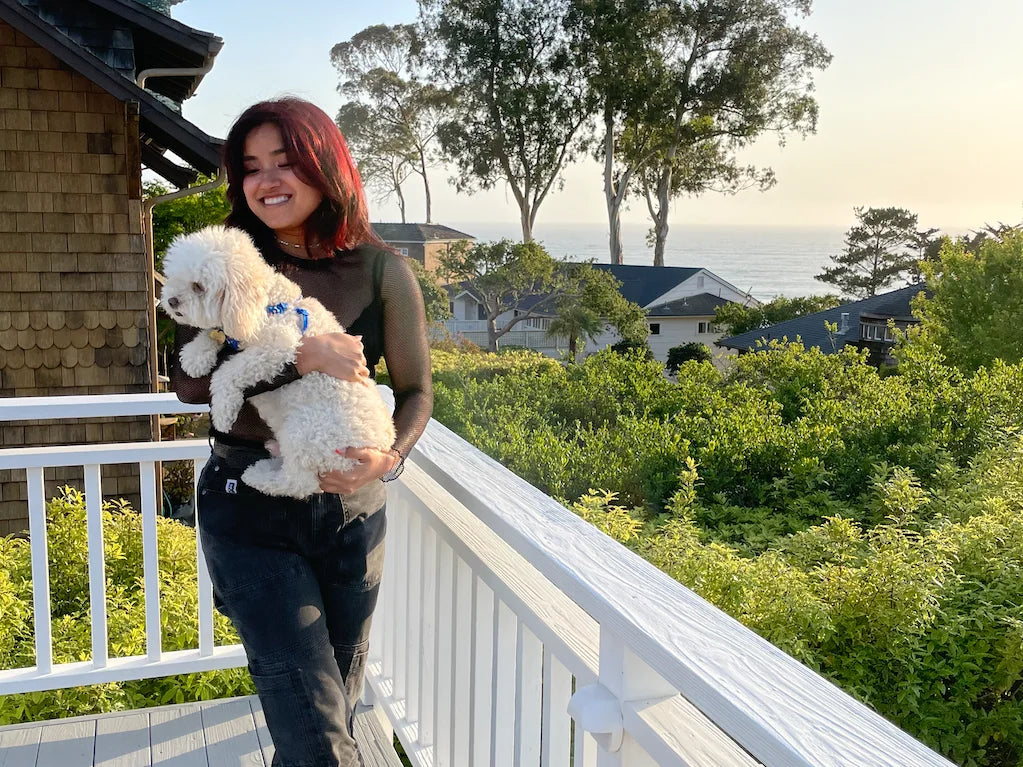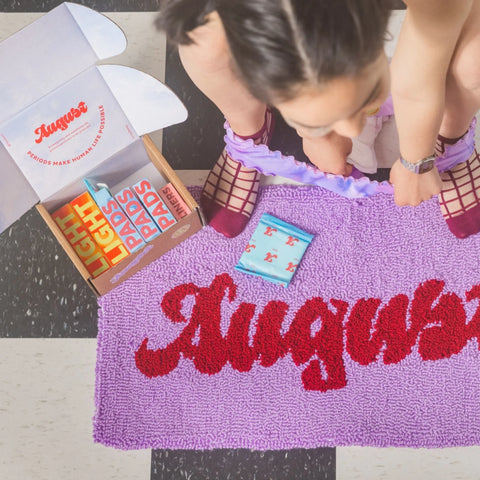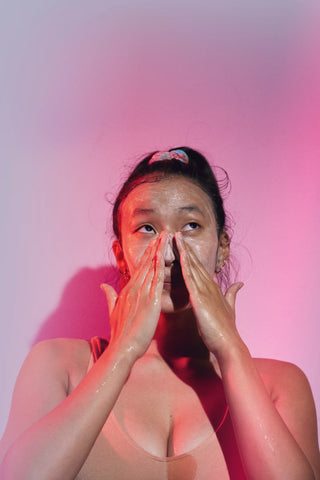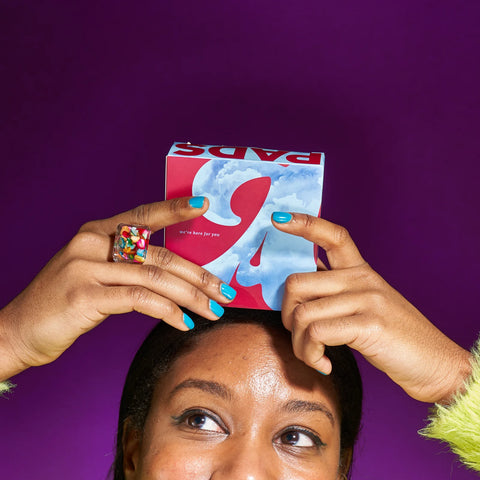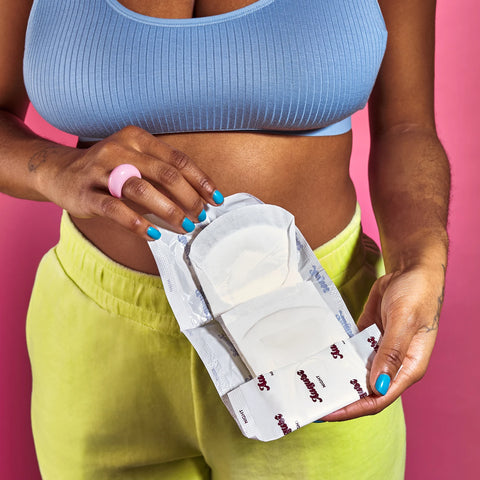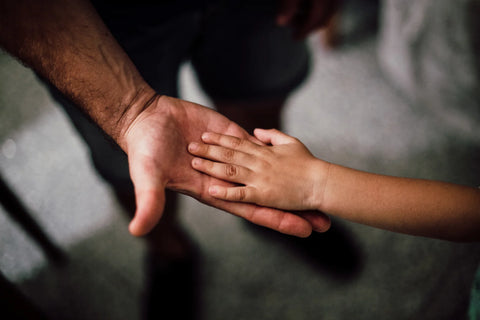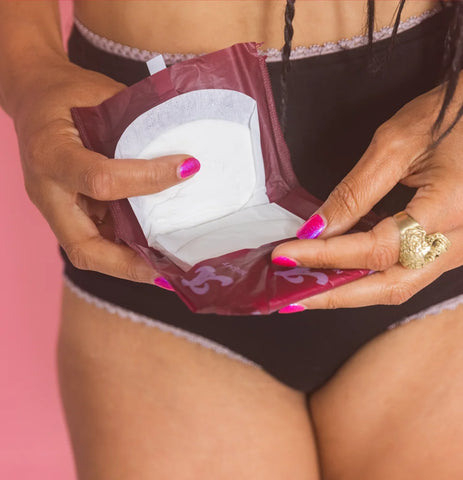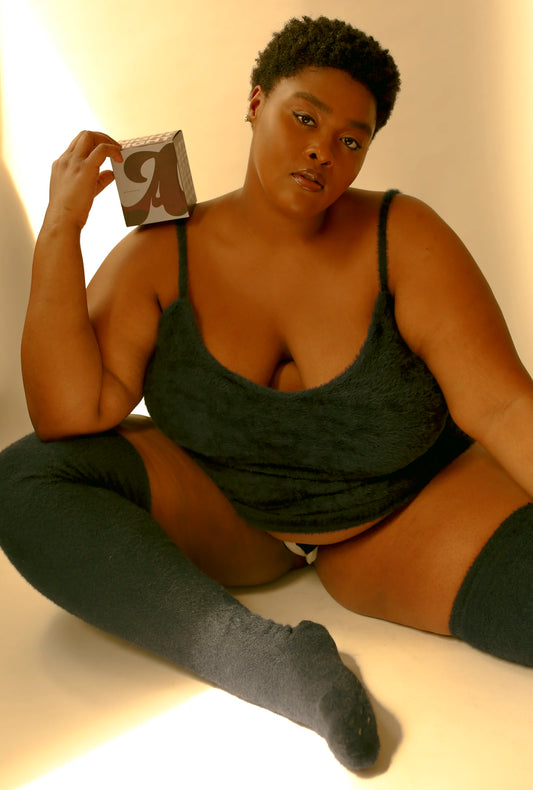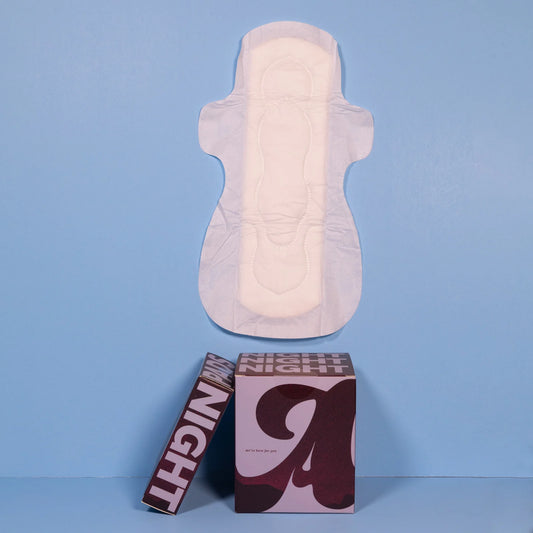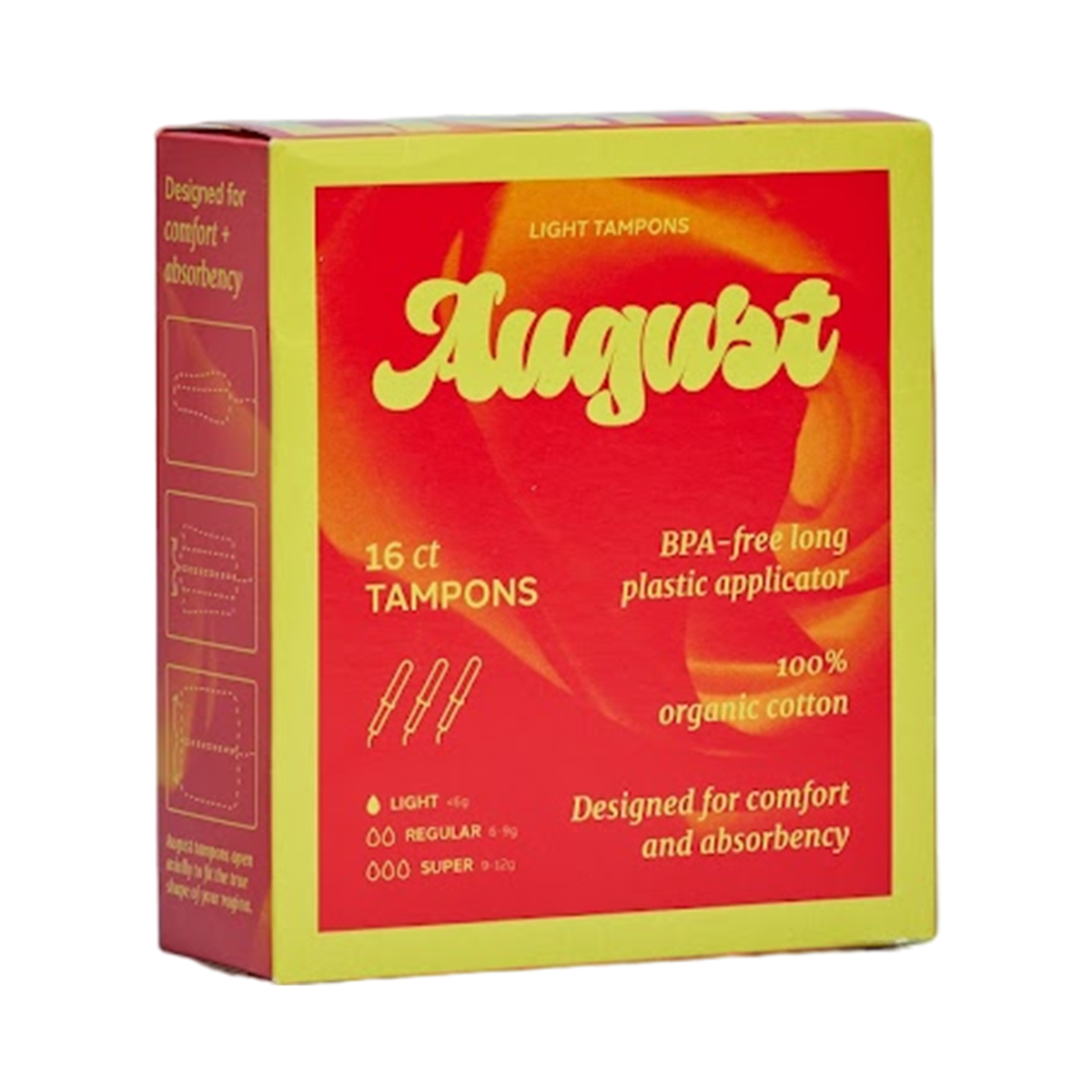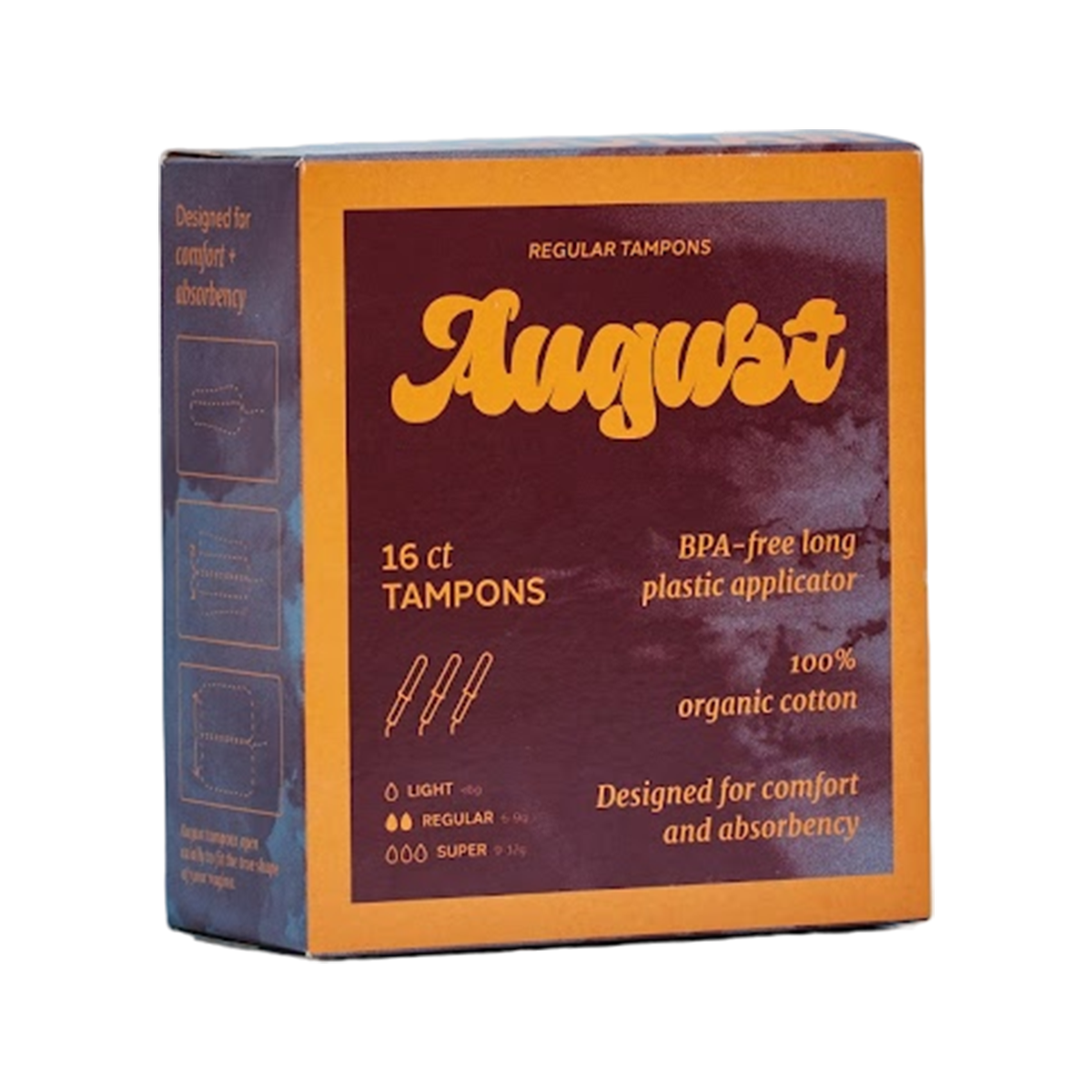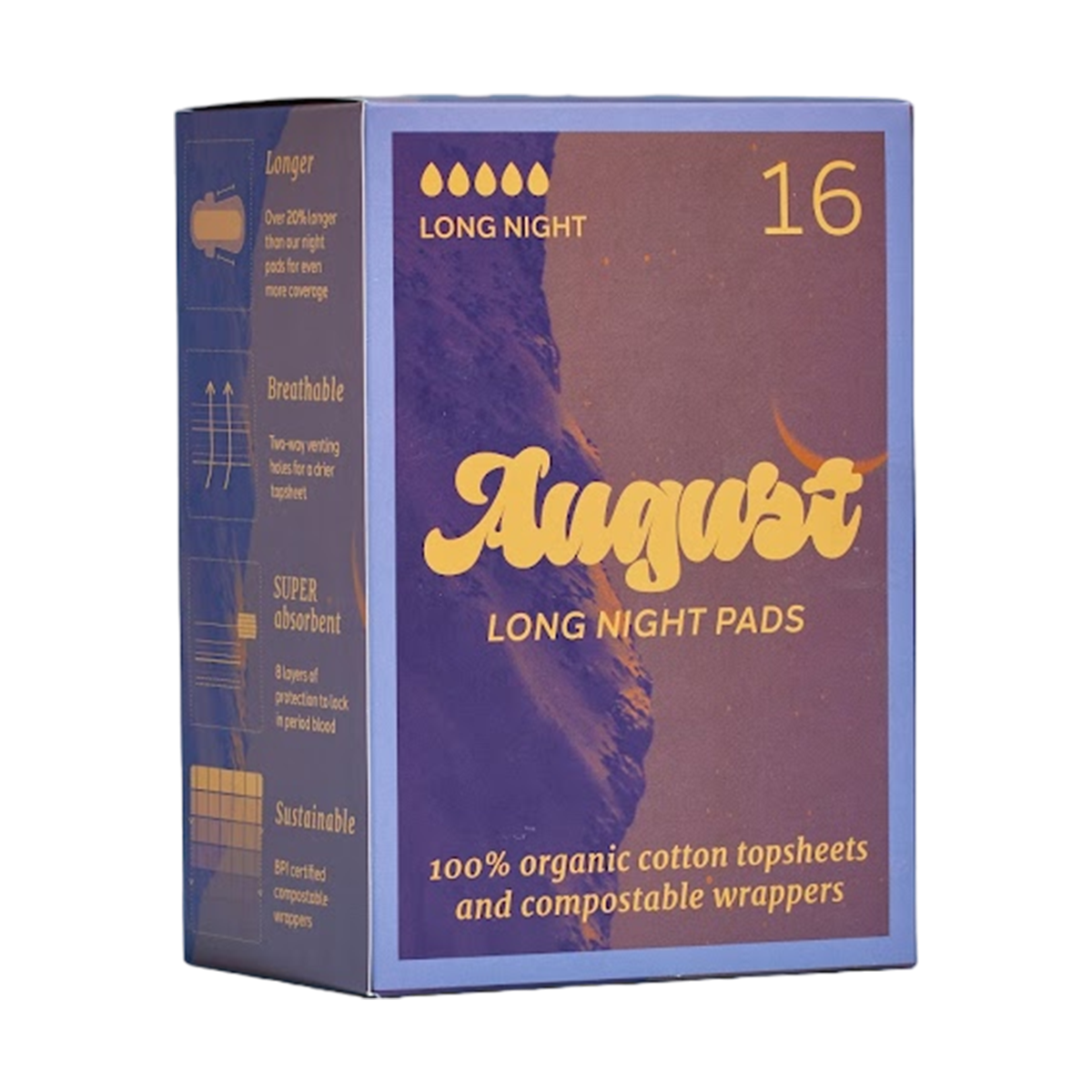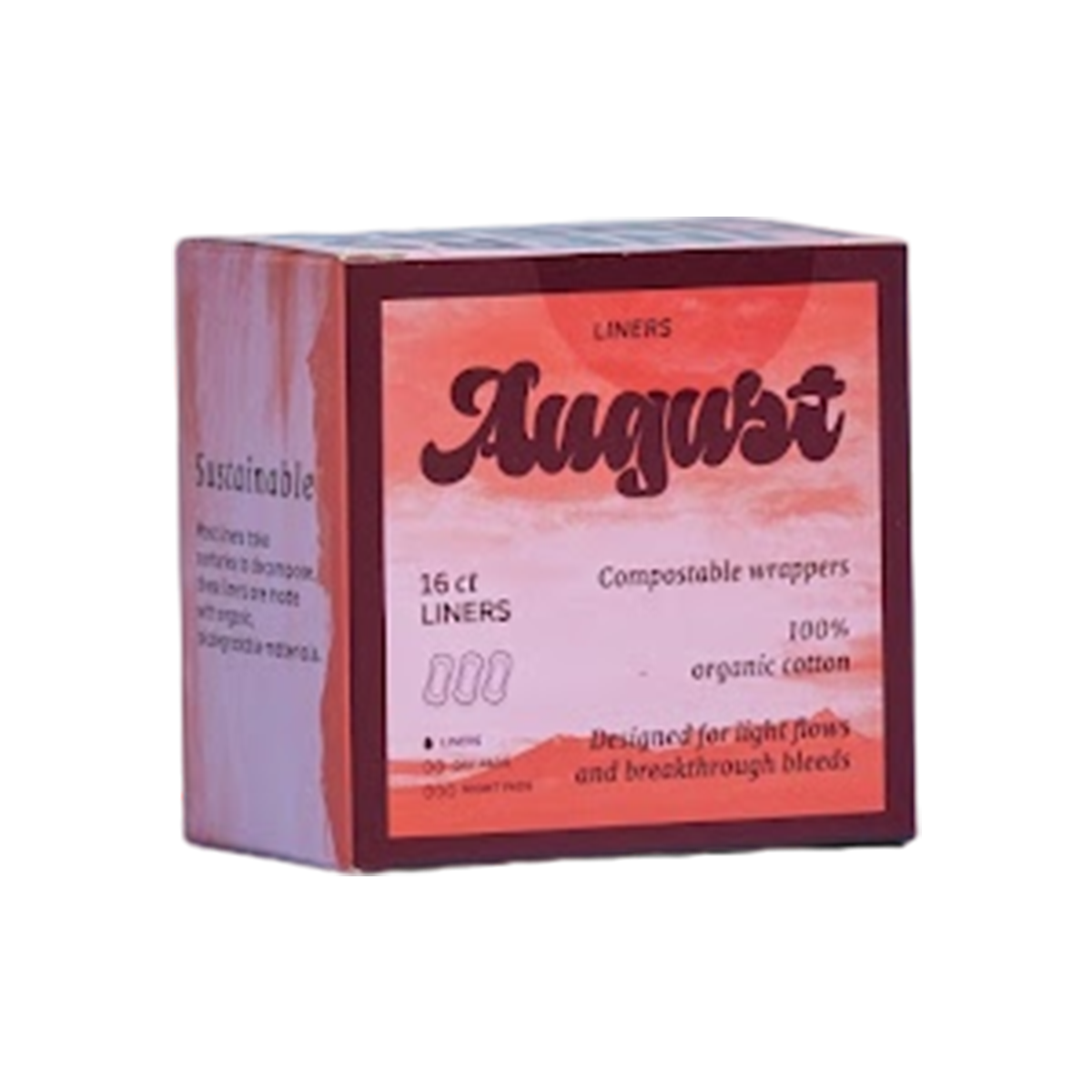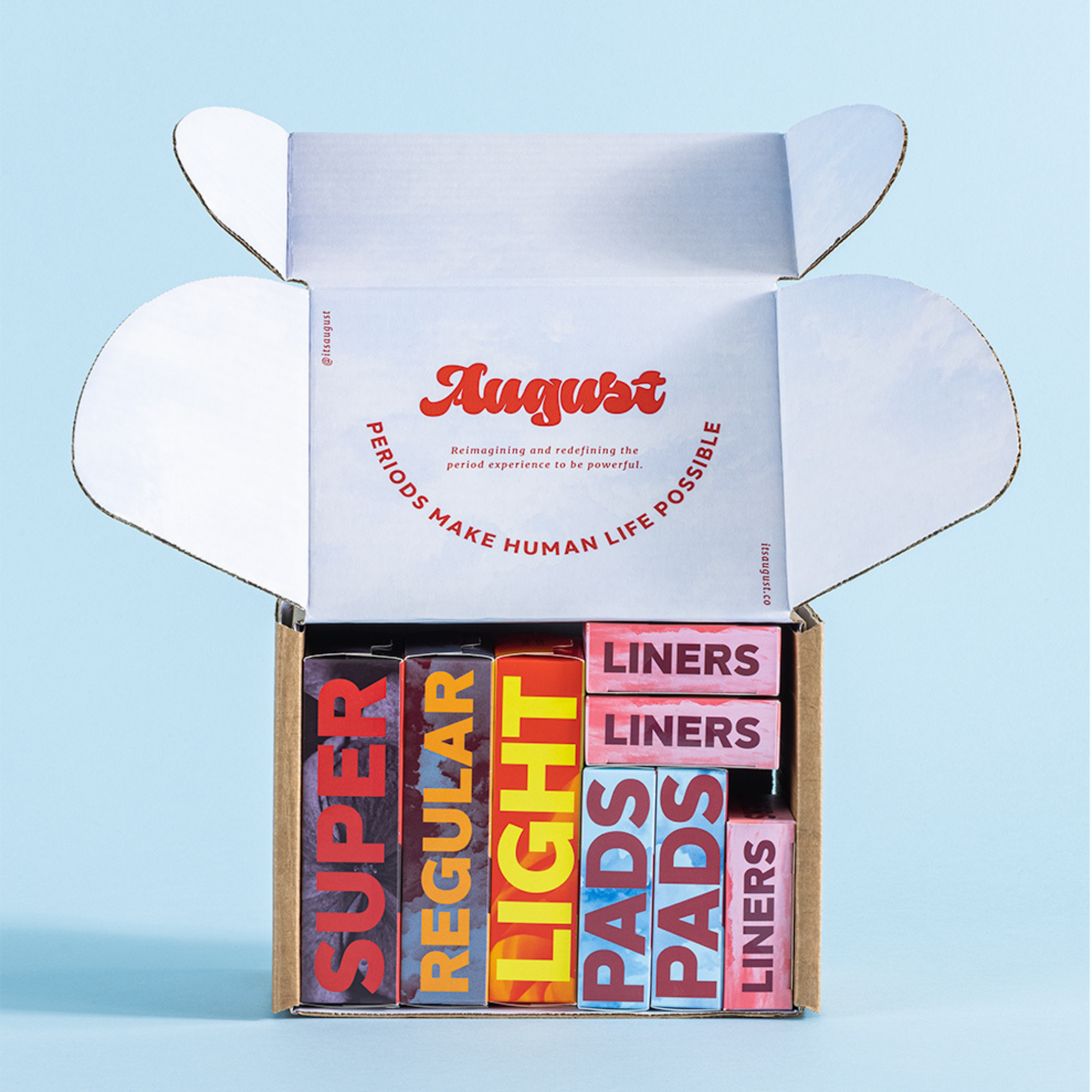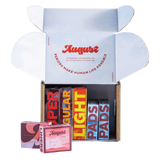Amenorrhea explained by Elena Gadekar

There is a gap in conversation around the effects exercise has on your period. Amenorrhea is the absence of menstruation. Menstruators who are athletes and exercise regularly may be at risk for developing athletic amenorrhea. Period care brand August sat down with their very own team member, Elena Gadekar to discuss the effects of exercise on your period. Gadekar was a ballerina before transitioning into weightlifting. This interview, Elena will answer all our period exercise fueled questions!
Introduction, what is your role at August and how did you get into regularly exercising?

Hey friends! My name is Elena and I’m August’s Customer Care Associate. I love interacting and chatting with all our customers on a daily basis <3 Their support is what keeps me and the company going and they’re also very involved in our product development convos.
Right now, I am really into weightlifting. But if you told me that 6 years ago, I would have never believed you. From age 6 to 17, ballet was my life. If I wasn’t at school, I was in the dance studio. And even though my studio was body inclusive, I still spent each day scrutinizing my form and lines in the mirror, which definitely affected my relationship with my body and how I viewed it.
After graduating high school, I took a gap year between high school and college and backpacked in Indonesia for 3 months. It was such a great experience - but I was also extremely homesick and not moving as much as my body was used to. In the span of 3 months, my body changed significantly, I gained 15 pounds, and I no longer felt like myself.
During my freshman year of college, I wanted to feel more empowered and reclaim my body. Weightlifting spoke to me and the rest is history. You might be thinking - “Elena…that’s a far stretch from ballet…” But I’ll reply – what ties the two together is the technique and discipline involved. Both movement forms can never be perfected.
I’ve come a long way since then and in 2019 I even became a personal trainer to help inspire other menstruators in the gym! What I’m really proud of is that my body currently sits at a heavier weight than it ever has, but I’ve never felt stronger and more capable than I do now! Weightlifting is so empowering and I’m really passionate about breaking the stigma around menstruators lifting heavy :)
Is it ok to exercise on my period?

Yes it is totally okay to exercise on your period. First and foremost - you should always listen to your body and rest days are both needed and welcomed. That being said, exercise can be beneficial for period health for a number of reasons (i.e. lowering stress, improving circulation, and reducing inflammation).
Personally, I find exercising during my period to be extremely empowering. However, it is rarely talked about. Growing up as a ballerina - I think the only time periods were mentioned was when one of my dance teachers mentioned that she leaked through her tampon and tutu DURING A PERFORMANCE and got blood on her partner’s shoulder during a lift. Glad that never happened to me :0
A little secret is that we actually perform our best from the day we start our period to about the day we ovulate, which is typically about 14 days later. From a scientific perspective, both of the hormones estrogen and progesterone are lower during this time period (although estrogen levels do increase significantly around day 12 right before ovulation) and while I don’t want to get too much into the nitty gritty science – TL;DR we not only feel stronger during our follicular phase (Days 1-14), we also feel less pain and recover much faster. (One book I would recommend if you are interested in learning more about the scientific perspective is Roar by Stacy Sims).
Can exercise help relieve or cause cramps? What has it been in your experience?
Besides the benefits I listed above, exercising can also help relieve cramps! Cramps are caused by the release of prostaglandins in the uterus. So you may be asking - What is prostaglandin? Prostaglandin is a compound that helps trigger the uterus to contract during your period, but because of this it is also the cause of pain and inflammation. Menstruators with higher levels of prostaglandins often describe more severe cramps while on their periods. However, exercise can combat this to a certain degree – thanks to the release of the “feel-good hormones,” also known as endorphins, and improved blood flow.
As I alluded to in the last question! I love working out on my period. That being said my cramps only last for two days when my flow is the heaviest, so I am definitely on the luckier side. On days where my cramps feel too intense for me to go to the gym, I still try to move my body because in the end it makes me feel better - whether that is going for a walk outside in the sun or doing some light stretching.
Is it ok if I don't want to work out on my period?
10000000000% yes! It’s your body and you should not feel any pressure to work out on your period! Period.
What is amenorrhea? What causes it?

Amenorrhea is the absence of a period. First, it is important to distinguish the difference between primary amenorrhea and secondary amenorrhea. Primary amenorrhea is usually defined as not having a period by age 15. We’re mostly going to be talking about secondary amenorrhea here, which refers to missing 3+ periods in a row when you used to have a period. Secondary amenorrhea has many causes including but not limited to pregnancy, perimenopause, stress, diet, birth control, exercise, and medical conditions including celiac disease, thyroid disease, and PCOS. If you used to have a period and have missed it for the past 3+ months, I would highly recommend checking-in with your healthcare provider.
Have you ever experienced amenorrhea? What changes have you experienced with menstruation and exercise?
I have personally never experienced amenorrhea, but some of my friends in the ballet and fitness industry have and the topic is often brushed under the rug. In fact, some people glorify losing their period, because they view it as a sign that they are pushing their body to an extreme. But it’s actually extremely dangerous, a sign that your hormones are not in balance, and can result in other health issues both in the moment and down the road.
With my exercise training schedule, I have not experienced any noticeable changes to my menstruation cycle, which I’m actually really happy about! Getting my period each month tells me that my body is in a happy state :)
Before we move into more details behind amenorrhea, I wanted to quickly walk through an average menstrual cycle. AVERAGE being the key word here (also important to note - many young menstruators have irregular periods and greater variations in cycle lengths, because their hormones are still balancing out). The average menstrual cycle is 28 days long, but can also range from 21-35 days. We can break down the cycle into two phases - the follicular phase and the luteal phase. The follicular phase is the start of your period to ovulation (half way through your cycle when an egg is released from your ovary), whereas the luteal phase is from ovulation to right before you begin your period again. You can look up a menstrual cycle hormone chart to track how estrogen and progesterone levels change through the cycle, but to simplify it – during the luteal phase, estrogen and progesterone levels are much higher. Why is this important? We can use our fluctuating hormone levels to improve performance in the gym – HOW COOL IS THAT!!!
Simple breakdown:
Follicular phase Estrogen and progesterone are low Body is better able to access carbohydrates Ideal time for HIIT and muscle building
Luteal Phase Estrogen and progesterone are high Body increases the percentage amount of fat it uses for fuel instead - which is not great for HIIT/race days Sweat response delayed, core temperature increases, greater sodium losses, increased muscle breakdown, bloating, more predisposed to central nervous system fatigue (aka exercise will feel harder!!) - I’ve definitely noticed that last one! Focus on lower-intensity workouts + slot in more recovery time
Hint: If you’re going for a PR (personal record) – do it in the follicular phase of your cycle!
How much exercise causes amenorrhea?
When menstruating athletes lose their periods, the most common cause is because of inadequate nutrition (aka they are not eating enough calories to sustain their activity level). A common misconception is that amenorrhea occurs if a person drops below a certain BMI. But that is not the case! To put it simply, the hypothalamus is a part of the brain that controls the hormone system in your body and hormones are chemical messages that allow different parts of your body to communicate with one another.
When we undereat and don’t give our body the amount of calories it needs to keep up with our activity levels, causing our hypothalamus to trigger a starvation response. For our reproductive organs, this means that ovulation is shut down!
TL;DR - No matter your body size – when your body is not receiving enough calories and it’s in a high stress state, hormones will signal your body that it is not in a safe environment to reproduce and your menstrual cycle will be disrupted!
Is it possible to reverse exercise-induced amenorrhea?
Yes! Yes! Yes! Properly fuel your body <3 Food is our friend!
Like I said before, exercise-induced amenorrhea is not caused by too much exercise (over-exercising is its own separate issue though), but is caused from the lack of calories to support all your daily activities. While there may be more underlying issues an individual needs to work through, it’s important for them to change how they are fueling their body.
What is the best treatment for amenorrhea? How to get your period back when experiencing amenorrhea?

I’m not a medical professional - so I would recommend checking in with one first. However, some lifestyle changes you could make would include increasing the amount of food you eat, lowering your activity level if you are over-training, and taking care of yourself to reduce stress levels.
Can a change in diet affect your period?

As a menstruator, we need more carbohydrates to be able to ovulate and have a period compared to our non-menstruating friends. Repeat after me - carbs are also our friends!! Think whole grains, rice, potatoes! When menstruators have a diet that is too low in carbs, there is a rise in both estrone and cortisol - hormones that actually signal for your body to store fat!
I want to make it clear that unless you have an allergy or intolerance there is no need to cut any food group out of your diet. I personally enjoy eating everything in moderation. That being said - the top 5 inflammatory foods include sugar, alcohol, wheat, dairy, and vegetable oils. While inflammation is not inherently bad (ex: inflammatory cytokines help fight against cancer and other infections), inflammation can also hinder ovulation and impair production of important reproductive hormones such as progesterone.
More than anything I would recommend the following to keep a healthy period: Make sure to eat enough calories to sustain your activity level Focus on the 3 main macronutrients - protein, carbs, and fat But also don’t forget those micronutrients - i.e. magnesium, zinc, vitamin D, and iodine :)
Can stress and exercise cause a late period?
Totally! Stress is not a bad thing, but TOO MUCH stress is and can cause you to have a late period or even miss it completely. Remember the hypothalamus - the part of your brain which is the hormone controller. Under high stress levels, the hypothalamus downregulates its signaling, which down the line lowers productions of hormones that are needed for ovulation (follicle stimulating hormone (FSH) and luteinizing hormone (LH)). While these hormones are not necessary for life, they are absolutely necessary for reproduction and a healthy menstrual cycle.
What can you do if you’re feeling stressed and burnt out? – Do things you enjoy, meditate, spend time with loved ones, go on a walk, seek out therapy :)
How do you manage exercise and periods?
LIke I mentioned earlier, I was blessed with periods that are not super painful. I honestly view my period as a superpower. Every month when I get my period, I’m reminded that I’m eating enough to meet the needs of my training! With my hormones in line - not only do I perform better at the gym, but I sleep better, recover better, and overall just feel better!
What inspired you and got you passionate about the topic of sexual health and wellness?
I work at August now and I’m absolutely loving it, but I was actually pre-med throughout my time at Columbia (and only recently deviated from this path). Back in high school, I shadowed and worked at a woman-owned OBGYN clinic for two summers and was completely in awe! After being exposed to sexual health and wellness from a medical perspective, I was so sure that I wanted to go into this field when I was older! While I may not be studying to be a doctor anymore, I think my passion for health and wellness has persisted.
What is the difference between amenorrhea and dysmenorrhea?
As we discussed, amenorrhea is the lack of a period. Dysmenorrhea is rather a term used to describe a painful period. While we normally associate period pain with cramps, dysmenorrhea can also be tied to any pain we feel 24-72 hours from the start of our period - including but not limited to headaches, back pain, nausea, vomiting, and diarrhea. Similar to how there is primary and secondary amenorrhea, there is also primary and secondary dysmenorrhea. Primary dysmenorrhea refers to the pain (most often cramping) that comes from having a period, while the pain associated with secondary dysmenorrhea is usually caused by another medical condition such as endometriosis, fibroids, adenomyosis, or pelvic inflammatory disease, lasts for a longer duration, and may be more severe.
Can birth control pills cause amenorrhea?

Yes – some people who take birth control pills (oral contraceptives) may not have a period. Even after getting off the pill, it may take some time before regular ovulation and menstruation returns. Every person is different, but the effects of going on/coming off the pill can cause a missed period as the body adjusts to the levels of synthetic hormone.
Can a copper IUD cause amenorrhea?
Since copper IUDs are one of the few birth control methods that doesn’t involve hormone manipulation, you shouldn’t start missing your period. In fact, copper IUDs actually tend to cause heavier periods with a longer duration.
What is post-pill amenorrhea?

Coined in the 1960s when birth control first came on the market, post-pill amenorrhea refers to not having a period after stopping the pill.
How long can post-pill amenorrhea last?
It really depends on the person. For some people coming off the pill, their periods start soon after. However for other individuals, ovulation and the return of periods can take up to 3 months. However, if you stopped taking the pill over 3 months ago and your period has not returned, I would recommend checking in with a health-care provider :)
How do you test for post-pill amenorrhea?

Since post-pill amenorrhea is a symptom, rather than a diagnosis, there is no specific test for it. If you’ve stopped the pill over 3 months ago and your period hasn’t returned, it is important for a doctor to look for underlying reasons - including but not limited to pregnancy, PCOS, premature ovarian failure, autoimmune diseases, diabetes, thyroid disorders, stress, being underweight or rapid variations in weight, excessive exercise, etc.
Can a woman with amenorrhea get pregnant?

This could definitely happen if the person has sex around the time of ovulation before their first period returns.
What causes hypothalamic amenorrhea?
Many things can cause hypothalamic amenorrhea, but things like eating disorders, rapid weight loss, stress, head injury or injury to the pituitary are the most common.
